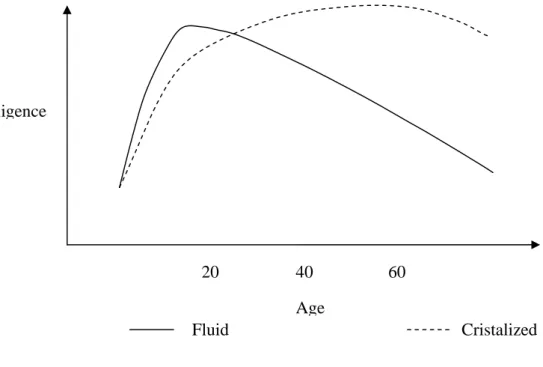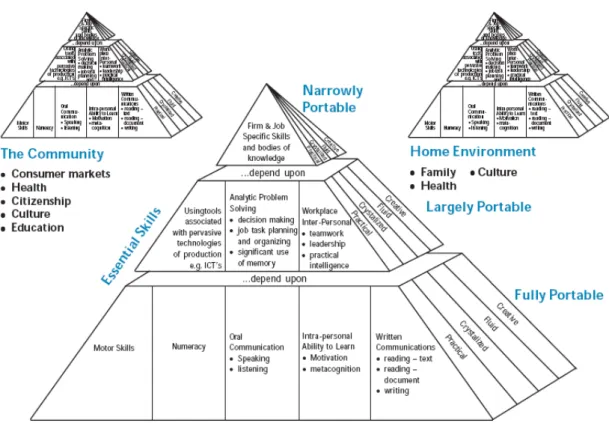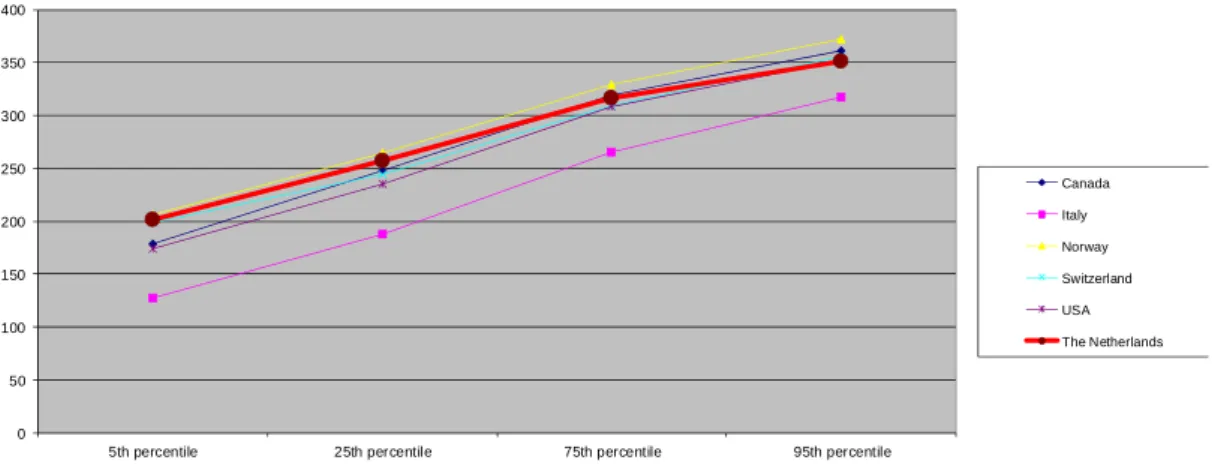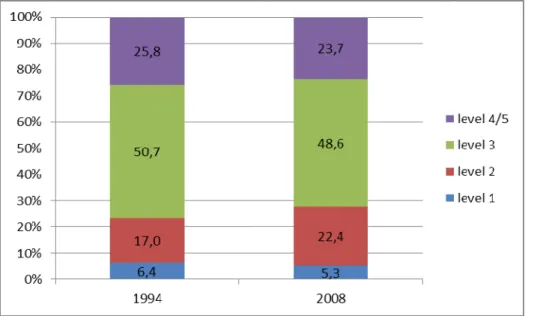There is good reason to believe that general skills such as reading and math – so-called foundational skills – underlie the development of all other types of skills, including 21st century skills. How the world is changing and how this affects the skills needs of the population. We will conclude this section by highlighting the impact of these changes on the skills needs of the population.
The changes in the economy and wider society as a result of the rapid technological developments in recent decades have been well documented. The speed of the developments and the adjustments required require much greater flexibility. While the importance of these 21st century skills is undeniable, it is important not to lose sight of the fact that other skills are also needed.
The fundamental difference from the earlier concepts of skills is the holistic nature of the concept of competence. The concept of "21st century skills" combines aspects of several of the above dimensions and typologies. It is also important to know how countries perform on different parts of the skills distribution.
For the lowest 5% and 25% of the skill distribution, the Netherlands together with Norway have the highest scores. There are also indications that a number of the so-called 21st century skills have been successfully implemented in Dutch secondary education. Another area that deserves attention is the relatively low position of the Netherlands in the area of citizenship.

Challenges related to the input How to deal with individual differences?
Considering the many changes in the world today, the implications these changes have for the skills needs of the population and the central role of education and training in delivering these skills, it is clear that the task for education and education professionals is unprecedented. Apart from the fact that our lecturers are still insufficiently prepared, Dutch education is otherwise reasonably well advanced with the implementation of ICT infrastructure. Some of these challenges stem from changes in educational inputs, such as the student population, budgets or teacher population.
Other challenges result from the changes required in the educational process, for example the introduction of innovative learning environments, or the timing and organization of the educational process. And of course some challenges are directly related to changes in the required output of education which are changes in the skills that need to be learned. Current forecasts indicate that education and health care are the two sectors most likely to face staffing shortages in the near future (ROA, 2009).
Consequently, their ability to process new information, adapt to changes in the environment and so on is likely to decrease. In combination, these changes mean that Dutch education must successfully implement curriculum reforms, introduce ICT tools in education and meet all the other challenges it is facing with increasingly strained budgets and a lack of teachers, especially those in the younger age groups who are is likely to be best equipped to deal with change.
Challenges related to the process
If these institutions are to play a significant role in lifelong learning, they will have to completely change their orientation and organization of the educational process. This will include the formal assessment and evaluation of prior learning experiences (EVC) to assess the current skills of the adults entering the programmes. In the Netherlands, most – if not all – of the upper secondary and higher education programs use some form of learner-centred method such as self-regulated learning, problem-based learning or project-based learning, and the goals of education are defined in terms of competences rather than skills.
The OECD Center for Educational Research and Innovation (CERI) has made a valuable contribution to this discussion with the publication of the report 'The Nature of Learning'. OECD, 2010a), where leading researchers advocate the development of innovative learning environments such as inquiry-based learning, collaborative learning and other student-centred teaching methods. It is therefore one of the key elements of many innovative learning environments (e.g. the Dutch educational reform in secondary education, "Studiehuis"). It appears that the adolescent brain is not yet mature enough to engage in the long-term planning necessary for effective self-regulation.
This is more the case for boys than for girls, which is probably one of the reasons why boys benefited less from the introduction of self-regulated learning in the “Studiehuis” than girls, as a recent evaluation by Coenen, Meng and Van der Velden (2011) showed. This structure helps students create a good overview of all the knowledge to be learned.
Challenges related to the required output
The main question is whether this constitutes an efficient use of the scarce resources available to schools. However, developing 21st century skills in education is primarily a matter of the form rather than the content of education. On the one hand there is great pressure to make resources available to develop talent at the top of the skills continuum.
The Veerman Committee (2010) took a completely different position in its review of Dutch higher education. Numerically, it is this group that makes up the bulk of the workforce, so it is critical that they receive adequate training. An important feature of the new skill requirements is that different skill domains are becoming increasingly intertwined.
Changes in the knowledge economy require more than just the development of 21st century skills, but also require further improvements in the level of basic skills such as literacy and numeracy. Furthermore, the creation of many jobs requires an increase in participation rates in higher education.
Actions related to the input
This implies that many measures aimed at improving the general quality of education coincide well with the requirements mentioned above. This applies, for example, to for the importance of early intervention programs to ensure that young, low-educated children entering primary school possess the skills they need to keep up with their more gifted peers and to ensure the effectiveness of subsequent learning processes (prevention is the best cure). In this section, we will not dwell on these more general actions, but concentrate on actions specifically related to the challenges mentioned above.
38 In other professional sectors, such as healthcare, we see that professional associations play a major role in developing standards and organizing non-formal training to keep professionals' skills up to date. It would be good to encourage discipline-related networks of educators to play a role in the development of professional standards, course materials, open content, dissemination of good practice and training of professionals.
Actions related to the process
These skills are already part of the curriculum in education, but their importance has increased even more in a technology-rich environment. Students need to learn how to evaluate and evaluate the information they can find on the Internet, and developing these Internet skills in relation to content should be part of the curriculum. Education can and should benefit from the ICT revolution, taking advantage of the opportunities created for example by open content, mobile technologies and innovative communication technologies.
The best way to promote this practice is by using existing professional networks and by making it part of the training of teachers (see above). It is therefore important to align the way we assess students with the aims of the curriculum, for example by using some form of authentic assessment. One way to deal with the problem of the gifted is to allow exams to be taken at different levels depending on the subject being taken.
40 case now, tertiary education courses may formulate specific requirements for the subject as well as the level of examination that must be taken to enter the program. This flexibility would solve many of the problems inherent in the early tracking system and allow for optimal talent development.
Actions related to the output
However important the so-called 21st century skills are, educators should base their programs and education systems more on the latest knowledge about the full range of skills needed in the world of the future, including basic skills and specific vocational skills. When it comes to the latest technology, young people are much more ICT-savvy than older people, and they will bring their versatile handheld devices into the classroom and expect to use them. In the Dutch case, the biggest bottleneck holding schools back from realizing such benefits may be the inadequacy of teacher training, especially in the area of making teachers aware of the didactic possibilities of ICT in the classroom.
In the absence of expert guidance, there is a real danger that students will mistake the large volume of the information flow at their disposal for real insight. As a general point, we warn against the risk of assessment being seen by students, teachers, schools or policy makers too much as a competition and too little as a way to gain a better understanding of the strengths and weaknesses of their education obtain. The Netherlands currently performs well on indicators of basic skill levels as well as in terms of educational attainment, but there are some concerns that we may not be doing quite as well at the top of the skill distribution.
There are competing demands on education to simultaneously meet the challenges of creating intellectual excellence for innovation and economic growth, while ensuring that as few people as possible fall off the education boat, and also to maintain high standards of quality for the large middle class. who are neither stupid nor geniuses, but form the backbone of our economy and society. Woessmann (2011), The Economics of International Differences in Educational Attainment, In: Handbook of the Economics of Education, Vol.


